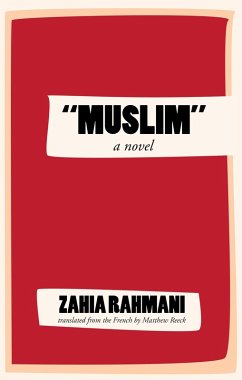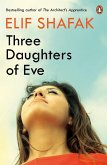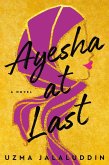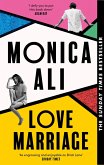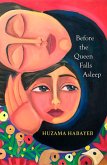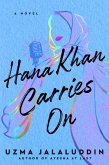Muslim: A Novel is a genre-bending, poetic reflection on what it means to be Muslim from one of France's leading writers. In this novel, the second in a trilogy, Rahmani's narrator contemplates the loss of her native language and her imprisonment and exile for being Muslim, woven together in an exploration of the political and personal relationship of language within the fraught history of Islam. Drawing inspiration from the oral histories of her native Berber language, the Koran, and French children's tales, Rahmani combines fiction and lyric essay in to tell an important story, both powerful and visionary, of identity, persecution, and violence.
Dieser Download kann aus rechtlichen Gründen nur mit Rechnungsadresse in A, D ausgeliefert werden.
Winner of the Albertine Prize 2020
One of Words Without Borders' most anticipated books of 2019
Part of the New York Times Globetrotting feature on upcoming 2019 Translations
Included in Translated Lit's Most Anticipated Books of February 2019
Librairie Drawn & Quarterly's New & Notable books
Included in Electric Literature's "20 Small Press Books You Might Have Missed"
Finalist for Big Other's Book Award for Translation
"A love letter to us: the outcasts, the hyphenated "others," those who have lost tongues and gained dialects. Zahia Rahmani speaks to the religious fairy tales of my girlhood, the Muslim lore we listened to while learning the Arabic alphabet. "Muslim" challenges the borders of genre, much like Rahmani pushes up against the boundaries of multiple, overlapping identities, investigating imposed definitions and complicating what it means to be colonized, woman, Muslim." - Dr. Seema Yasmin
"'I was born into a minor language and escaped from a distant nowhere that didn't want me,' Zahia Rahmani writes in this chronicle of the numerous forms isolation can take-and the numerous ways that identity can be both claimed and projected onto someone. This novel is brief in length, but Rahmani's approach to it allows for a constant mutability of its form and a series of limitless stylistic renewals." - Tobias Carroll, Words Without Borders
"This is the ethical and political terrain at stake for Rahmani, whose literary fiction is an instrument for truths that as yet have nowhere else to be heard. That the very nature of our political regimes requires intervention by way of fiction suggests that literature has an indispensable role to play in the ongoing work of justice."- Jill Jarvis, Public Books
"Absolutely essential reading." -Lyric Hunter, Brazos Bookstore
"The role of myth and archetypes, identitarian persecution, faith, movement through borderlands, naming, and the limitations and potential of particular languages all figure into this autobiographical novel."-Aaron Robertson, Lit Hub
One of Words Without Borders' most anticipated books of 2019
Part of the New York Times Globetrotting feature on upcoming 2019 Translations
Included in Translated Lit's Most Anticipated Books of February 2019
Librairie Drawn & Quarterly's New & Notable books
Included in Electric Literature's "20 Small Press Books You Might Have Missed"
Finalist for Big Other's Book Award for Translation
"A love letter to us: the outcasts, the hyphenated "others," those who have lost tongues and gained dialects. Zahia Rahmani speaks to the religious fairy tales of my girlhood, the Muslim lore we listened to while learning the Arabic alphabet. "Muslim" challenges the borders of genre, much like Rahmani pushes up against the boundaries of multiple, overlapping identities, investigating imposed definitions and complicating what it means to be colonized, woman, Muslim." - Dr. Seema Yasmin
"'I was born into a minor language and escaped from a distant nowhere that didn't want me,' Zahia Rahmani writes in this chronicle of the numerous forms isolation can take-and the numerous ways that identity can be both claimed and projected onto someone. This novel is brief in length, but Rahmani's approach to it allows for a constant mutability of its form and a series of limitless stylistic renewals." - Tobias Carroll, Words Without Borders
"This is the ethical and political terrain at stake for Rahmani, whose literary fiction is an instrument for truths that as yet have nowhere else to be heard. That the very nature of our political regimes requires intervention by way of fiction suggests that literature has an indispensable role to play in the ongoing work of justice."- Jill Jarvis, Public Books
"Absolutely essential reading." -Lyric Hunter, Brazos Bookstore
"The role of myth and archetypes, identitarian persecution, faith, movement through borderlands, naming, and the limitations and potential of particular languages all figure into this autobiographical novel."-Aaron Robertson, Lit Hub
Winner of the Albertine Prize 2020
One of Words Without Borders' most anticipated books of 2019
Part of the New York Times Globetrotting feature on upcoming 2019 Translations
Included in Translated Lit's Most Anticipated Books of February 2019
Librairie Drawn & Quarterly's New & Notable books
Included in Electric Literature's "20 Small Press Books You Might Have Missed"
Finalist for Big Other's Book Award for Translation
"A love letter to us: the outcasts, the hyphenated "others," those who have lost tongues and gained dialects. Zahia Rahmani speaks to the religious fairy tales of my girlhood, the Muslim lore we listened to while learning the Arabic alphabet. "Muslim" challenges the borders of genre, much like Rahmani pushes up against the boundaries of multiple, overlapping identities, investigating imposed definitions and complicating what it means to be colonized, woman, Muslim." - Dr. Seema Yasmin
"'I wasborn into a minor language and escaped from a distant nowhere that didn't want me,' Zahia Rahmani writes in this chronicle of the numerous forms isolation can take-and the numerous ways that identity can be both claimed and projected onto someone. This novel is brief in length, but Rahmani's approach to it allows for a constant mutability of its form and a series of limitless stylistic renewals." - Tobias Carroll, Words Without Borders
"This is the ethical and political terrain at stake for Rahmani, whose literary fiction is an instrument for truths that as yet have nowhere else to be heard. That the very nature of our political regimes requires intervention by way of fiction suggests that literature has an indispensable role to play in the ongoing work of justice."- Jill Jarvis, Public Books
"Absolutely essential reading." -Lyric Hunter, Brazos Bookstore
"The role of myth and archetypes, identitarian persecution, faith, movement through borderlands, naming, and the limitations and potential of particular languages all figure into this autobiographical novel."-Aaron Robertson, Lit Hub
One of Words Without Borders' most anticipated books of 2019
Part of the New York Times Globetrotting feature on upcoming 2019 Translations
Included in Translated Lit's Most Anticipated Books of February 2019
Librairie Drawn & Quarterly's New & Notable books
Included in Electric Literature's "20 Small Press Books You Might Have Missed"
Finalist for Big Other's Book Award for Translation
"A love letter to us: the outcasts, the hyphenated "others," those who have lost tongues and gained dialects. Zahia Rahmani speaks to the religious fairy tales of my girlhood, the Muslim lore we listened to while learning the Arabic alphabet. "Muslim" challenges the borders of genre, much like Rahmani pushes up against the boundaries of multiple, overlapping identities, investigating imposed definitions and complicating what it means to be colonized, woman, Muslim." - Dr. Seema Yasmin
"'I wasborn into a minor language and escaped from a distant nowhere that didn't want me,' Zahia Rahmani writes in this chronicle of the numerous forms isolation can take-and the numerous ways that identity can be both claimed and projected onto someone. This novel is brief in length, but Rahmani's approach to it allows for a constant mutability of its form and a series of limitless stylistic renewals." - Tobias Carroll, Words Without Borders
"This is the ethical and political terrain at stake for Rahmani, whose literary fiction is an instrument for truths that as yet have nowhere else to be heard. That the very nature of our political regimes requires intervention by way of fiction suggests that literature has an indispensable role to play in the ongoing work of justice."- Jill Jarvis, Public Books
"Absolutely essential reading." -Lyric Hunter, Brazos Bookstore
"The role of myth and archetypes, identitarian persecution, faith, movement through borderlands, naming, and the limitations and potential of particular languages all figure into this autobiographical novel."-Aaron Robertson, Lit Hub

